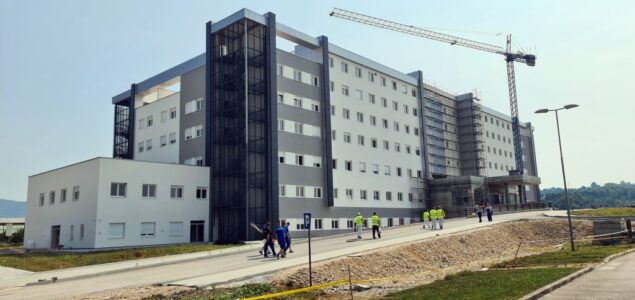New deadlines and new millions for the Doboj Hospital for the Chinese
Povezani članci
- After Spin info’s writing, the Ombudsman of RS filed a lawsuit against the company “ECO PRODUCT”
- CAPITAL came to the list of overpaid lawyers of RUGIP: Millions for formal affairs
- CAPTURED STATE: The Illicit Battle for Security Agencies and State Control
- Bust of academician Vojo Dimitrijević as a “skeleton from the closet” for the Sarajevo City Administration
- Scandal during the appointment of judges. Apart from the results of the competition, the Supreme Court of Justice favours the children of lawyers and attorneys. No explanation
- SDA cadres: Alden Kajtaz, the first man of the Ministry of Education employed on the basis of forged documentation

foto: SRNA
The Ministry of Health and Social Welfare of Republika Srpska will, for the second time, accommodate the Chinese company ‘China Sinopharm International Corporation’ and extend the deadline for the completion of the hospital in Doboj.
With the Chinese, the construction of the intensive care unit and numerous other works not originally included in the basic contract have been subsequently agreed upon. This means that the construction of the hospital, whose contracted price was around 103.5 million KM, and which has already been the subject of numerous criticisms, will now exceed 120 million KM.
This represents a sort of compensation, as according to CAPITAL’s information, the Chinese partner for the hospital construction requested additional funds, justifying it with inflation.
On the other hand, during the construction, the ministry repeatedly added works to the list that were not foreseen in the tender documentation, which is why the entire project will cost about 20 per cent more than originally planned.
The contract with ‘Sinopharm’ and its partner ‘Shanxi Construction Investment Group’ was signed in March 2019.
The deadline for the construction and equipping of the hospital was 36 months on a turnkey basis model.
However, a year later, the world was hit by a pandemic, and Ukraine and Russia entered into armed conflict.
According to the authorities in Republika Srpska, this was enough reason to extend the deadline for the completion of the hospital for Chinese companies until September of this year.

Explaining that movement was restricted and construction material prices surged due to events in Ukraine at the end of last year, an annexe to the contract was signed.
At that time, it was announced that neither party was responsible for these events, as they could not have been predicted or avoided, and new deadlines were agreed upon.
There are two and a half months left until September 30th, but it is already clear that the Chinese companies will not meet this deadline.
Šeranić: Floors Drying Slowly Due to Moisture
This was confirmed by the relevant minister, who visited the construction site on Tuesday. Justifying the Chinese partners, he said that they faced all possible difficulties during the construction. The latest in a series of justifications is the significant moisture caused by heavy rainfall.
“The rain has caused slower drying of the floors. We have a problem and must wait for everything to dry before we can bring in equipment. In the discussion with the supervision, I was informed that the contractors did everything they could regarding this matter”, said Šeranić.
Despite the shifting deadlines and delays in the work, Šeranić is satisfied with what he saw while inspecting the unfinished hospital.

PHOTO: Srna
“We don’t need to rush, but rather focus on the quality of the work. This hospital is not being built for two, three, or five years, but for several decades”, said Šeranić.
He also stated that he expects the hospital to be completed by the end of the year. He confirmed that the project is being expanded to include the construction of an intensive care unit for non-surgical areas.
However, Šeranić did not disclose how much all of this will cost.
The Ministry of Finance stated to CAPITAL that “Sinopharm” requested additional funds due to events in the global market, which led to a significant increase in material and equipment prices.
“As a result, the contractor requested a change or an increase in the contracted value, but his request was not granted. However, based on the experience of dealing with the pandemic during the project implementation, the ministry assessed that the project should include an intensive care unit for non-surgical branches, which was not covered by the basic contract. Therefore, that part of the project modification, at the request of the client, is the subject of negotiations with the contractor”, they stated.
Regarding our additional questions about whether an agreement had been reached before the publication of this text, they did not provide an answer.
Furthermore, they did not provide the basic contract signed after the completion of the tender when we asked for it.
“It was publicly available as part of the tender documentation in the process of international public procurement that was conducted”, the ministry said.
Additional Works Increase the Project Cost
As CAPITAL learns, the Ministry has repeatedly supplemented the list of works during the construction, leading to delays and additional payments to the contractors.
Although not initially included in the technical documentation, requests were made for the subsequent construction of a wastewater treatment plant, an oxygen tank, a lift for transporting corpses, and a steam system in the sterilization unit.
On the other hand, the Ministry abandoned the construction of a heliport that had already begun at the time.
According to our sources, all of this will further increase the cost of the basic contract. However, the increase is expected to remain within legal limits, up to 20 per cent, to avoid re-tendering.
Both sides mostly remain silent about everything that happens behind the walls of the new facility.
At “Sinopharm”, they are extremely pleased with the relationship with the Ministry and the government, expressing their gratitude for their understanding.
Deputy General Manager of the Business Unit for Central and Eastern Europe at Sinopharm, Juan Džuangđun, didn’t utter a word about delays and issues during Minister Šeranić’s visit, claiming that everything is proceeding according to plan.
Thus, the arrival of this company in Doboj is presented as a significant event for the local economy.
“During the project implementation, we selected local subcontractors, creating hundreds of jobs for Republika Srpska. With the joint efforts of Chinese and domestic engineering teams, the project’s quality is at a high level. The project is in its final stage, and we look forward to the next year when the local population will have access to first-rate healthcare”, he said.
Originally planned, the hospital will cover an area of 28,078 square meters, with a net floor area of 25,390 square meters.
The new hospital is designed to provide long-term service to approximately 330,000 residents from the Doboj region of Republika Srpska, the Zenica-Doboj Canton, and the Tuzla Canton.
It will have a total of 468 beds and medical specialist services, including a main operating block with four operating rooms, an emergency block with an operating room, a diagnostic centre with more than 22 different radiological and other diagnostic procedures, day outpatient services with around 20 specialist consultations, and a therapeutic oncology day hospital.
Chinese Chosen Despite Higher Cost
It is interesting how “Sinopharm” secured the contract for the construction of the hospital.
Initially, the contract was awarded to the German-Montenegrin consortium “Lindner”, but the Chinese, whose offer was rejected as unacceptable, managed to overturn it before the Office for the Review of Complaints (ORC) of Bosnia and Herzegovina.
In their appeal, they stated that the Ministry of Health and Social Welfare did not allow them to copy and photograph “Lindner’s” offer but only allowed them to inspect it. As a result, the ORC considered that access to evidence relevant to preparing the appeal was made more difficult.
Also, the ORC accepted their claims related to meeting the conditions and completing the documentation, which were the reasons for the ministry’s rejection.
The offer of the Chinese consortium thus becomes the most favourable one overnight, changing from unacceptable to preferred. As a result, the ministry revises its decision and awards the contract to the Chinese consortium, even though their offer is 700,000 KM more expensive.
Hospital Built on a Flood-Prone Area
Tihomir Dejanović from the Center for Humane Policy in Doboj believes that missing deadlines are not as significant of a problem as the choice of the hospital’s location.
“For the citizens of Doboj, the bigger issue is that the hospital is not being built in a suitable location. The current site next to the main road was flooded in 2014. Another location should have been chosen, but now it’s too late”, says Dejanović.
A similar view is shared by Olivera Nedić, a PDP councillor in the Doboj city assembly. She states that the city is a regional center and there is an unquestionable need for such a facility, but everything else related to its construction is questionable.
“It all seems like a bunch of excuses that do not meet the needs of the community and the citizens who are paying a high price for it. I’m not from the construction field, but after talking to a few experts, they raise questions about what will happen in case of a flood recurrence”, she says.
Nedić adds that the idea of reconstructing the existing hospital and utilizing its potential was never thoroughly considered.
“A valid and firm professional opinion should have been secured, but it is not respected in Doboj because professionals’ voices are seldom heard here. I have the impression that the interests of big capital are mainly catered to”, she concludes.


 ENG
ENG





























